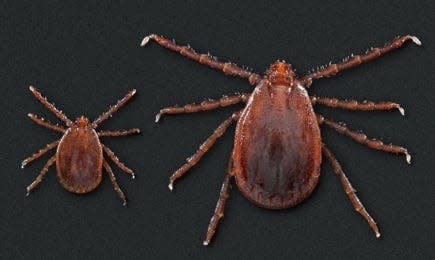CDC issues warning about Asian longhorned tick: What you need to know.

WORCESTER — The Center for Disease Control and Prevention is out with a new warning about the Asian longhorned tick as the invasive pest's population continues to surge across the U.S.
First spotted in the Western Hemisphere back in 2017 and in Massachusetts in 2022, the tick has now made its home in 19 states. Other states include Arkansas, Connecticut, Delaware, Georgia, Indiana, Kentucky, Maryland, Missouri, New Jersey, New York, North Carolina, Pennsylvania, Rhode Island, South Carolina, Tennessee, Virginia and West Virginia.
The tick has been found on pets, livestock, wildlife and humans, and has the ability to reproduce without mating, allowing it to quickly infest an animal with its offspring. The warning follows the death of three cows in Ohio, after being infested with the ticks.
"Thousands of ticks may be found at a time in grass or shrubs or on an animal," the CDC said.
According to the CDC, the tick appears to "be less attracted to human skin" than other species, such as the blacklegged tick or American dog tick.
Recent studies found the Asian longhorned tick typically isn't associated with Lyme disease; however, researchers did find the tick has been known to carry and spread Rocky Mountain spotted fever, which can be deadly.
Here in Massachusetts, the illness is incredibly rare, with just nine cases reported between 1995 and 2007. Symptoms can include a rash on the extremities, sudden fever, headache, body aches and nausea. Some cases can bring on a cough.
How to reduce your risk from ticks
Despite the lower risk for humans, experts urge the public to take preventative measures against ticks, such as using insect repellent and performing thorough tick-checks after being outside. If you happen to spot a tick, remove it immediately and note the date on the calendar.
The CDC recommends saving the tick in a jar or Ziploc bag with rubbing alcohol, just in case you fall ill. Contact your health provider if you have been bitten and develop a rash or any other symptoms in the days after the bite.
This article originally appeared on Telegram & Gazette: Asian longhorned tick warning: What Mass. residents should know
